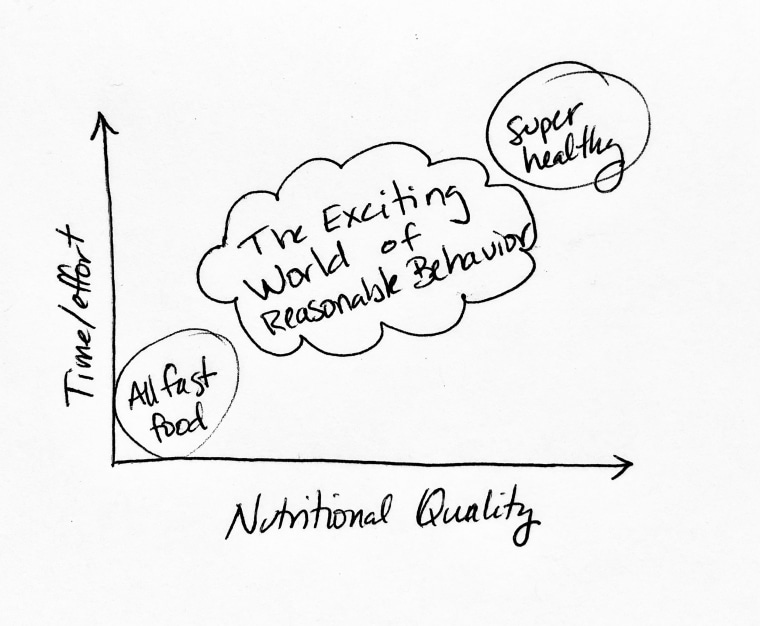“I threw out all the junk food in the house, and right after our appointment today, I’m going straight to the grocery store to buy only healthy food.”
“I told the kids no more french fries!”
“I know what I need to do. I just need to do it.”
If any of these sound familiar to you, I have two words for you: Whoa, Nellie!
You might be holding yourself back when it comes to building healthy habits, because that’s just it— habits are built over time, not made out of thin air.
My favorite part of nutrition counseling is helping patients see how their thinking patterns and assumptions are actually sabotaging their hard work, and then how to reframe. Here are five ways you might be digging your own pitfalls.
1. Perfectionism
Perfection is an awful tyrant. It lies. It will tell you that none of your perfectly fine efforts, the ones that I am really proud of you for, are good enough. And if you are happy with how you are doing, then when something inevitably happens to throw you off your game, when someone gets sick or things are crazy at work and you pick up fast food every night for a week, does it let you move on the following week and pick up where you left off? Noooooo, it tells you that you broke it! “You’re just hopelessly terrible at this,” it says, “What is wrong with you?” When everyone on social media is obviously brilliant and excellent and living their best Speedo-wearing lives drinking their beet and kale juice, you are sadly a total lump of a failure who should just quit.
The reframe? Let it go.
When you let go of perfection, you open yourself to the possibility of improvement, and any improvement is worth making. Let’s say you pick up fast food every night now. Instead of saying no more french fries, you could say you’re going to cook dinner once a week. That would be a 15% reduction in your consumption of french fries! Or, instead of throwing out every recipe you’ve ever made and going vegan overnight, start by having meatless Monday. If that goes well, once you’ve gotten some easy and appealing recipes under your belt, found some snacks you like, then you can think about going for it. Sustainable change does not happen by flipping a switch. I hear that you want to set a healthy diet habit, but it isn’t just one habit; it’s about a thousand! I didn’t learn how to plan, implement and prepare a healthy meal plan in a single one-hour class. Why would you expect yourself to, after talking to a dietitian for one appointment, or just reading a handout your doctor gave you?
2. All-or-nothing thinking
Nothing will hamstring your attempts at establishing healthier habits more than this one. Often, by the time a client gets to me, they’ve already cycled through many rounds of different restrictive diets alternating with eating whatever they want. They may have lost and regained weight more than once, or reversed prediabetes only to see it come roaring back. When we talk over their history, they typically say that they were “doing really well” and then hit a wall, and they feel like they’ve failed. (Sound familiar?) They didn’t fail, though; they were just spending all of their willpower budget in one place, allocating a lot of money and countless hours meal planning or following a tightly controlled, tunnel-vision eating plan not written with them in mind, with long lists of “unhealthy” foods they love versus “healthy” foods they don’t like or don’t know how to cook. They felt controlled by their food, it was too much to sustain, and they gave up.
The reframe: Aim for the middle.
I like to draw this graph for people I meet in the office.

As you can see, between spending all that time and effort to force yourself into a healthy pattern that doesn’t work for your life, and just giving up and eating junk all the time, there is a whole range of reasonable behavior. Who knew, right? Some weeks you’ll have time and energy to look up some recipes and cook, and other weeks you won’t have so much. Anywhere in there in the middle is where I hope for you to be. Getting comfortable with nuance can help you understand how there’s no such thing as a healthy or unhealthy food, either — some very high calorie foods have heart healthy fats or lots of protein, and some low-calorie foods are nutritionally useless. Too much of the former, and it might be hard to maintain your weight, but too much of the latter, and you could raise your risk for bone fractures or infection, or even low metabolism. All foods have their good and not-as-good qualities, and it’s the overall nutrient density of them together, the meeting in the middle, where you can find balance.
Sustainable change does not happen by flipping a switch. I hear that you want to set a healthy diet habit, but it isn’t just one habit — it’s about a thousand!
Heather Martin, RD
3. Magical thinking
All of us fall for this one from time to time, and make no mistake — health food and supplement marketers know it. They’re well aware we will pay a lot of money for the fairy tale that will let us eat whatever we want, so that’s what they try to sell us. If the ad you’re looking at flashes all caps in bright colors, references “clinical research” without linking to a real journal, and has a looped computer graphic of a creepy mannequin dropping 2/3 of its body weight by taking a single pill, be wary. It’s not just pills, either —there’s always some superfood fad that takes a grain of truth and balloons it out of proportion. For a while everything was fat free, remember? And then it was multigrain. After that, they put pomegranate flavoring in everything from frosted cereals to hand lotion. Right now the magic word is cauliflower.
The reframe: What’s the science?
There certainly are good supplements, and good reasons to use them, but it’s critical to get your information from medical experts, peer-reviewed research and official sources like websites ending in .edu or .gov before blowing half your paycheck. There’s no single superfood that you have to eat to be healthy, and in fact, I’m more interested in an overall varied diet than anything in particular. But, if you’re interested in trying the latest thing, find out what the hype is about first. If you read that pomegranate juice is high in antioxidants, but then see “1% juice” or “pomegranate flavored” on the label, think twice. If you know that rather than being imbued with magical properties, cauliflower is a staple of keto diet recipes because it’s very low carbohydrate, you might understand that coating it in breading, deep frying and slathering it in sweet chili sauce doesn’t make hot wings healthy. Science doesn’t know everything, so sometimes advice changes over time, but it’s clinically proven to be more reliable than magic beans!
4. Shaming
Maybe the thing about feeling your new lifestyle is “broken” when you’ve had a bad week rings a bell. What do you remember telling yourself at times like that? For many of us, it’s a real shame spiral, progressing from “I’m bad at healthy living” to “I’m bad at everything.” Not only is this untrue, it’s also counterproductive. Yelling at yourself like an unhinged little league coach is actually more likely to result in continued crummy diet and low activity. There are even studies showing that people who are shamed by those around them have higher cortisol levels and are less likely to find a healthy medium. I’m not just being nice to you when I say you should learn to speak to yourself with kindness and encouragement; it’s my clinical judgement about what is medically best.
The reframe: Curiosity
This is not a disaster, a boulder of regret for you to chip away at with your beloved little hammer of judgment. It’s just you, and your present circumstances, and as a counselor friend of mine says to clients, you get to figure this out! Whatever big, beautiful and tangled mess it is, it’s yours, and so are the solutions. By all means, listen to your doctor, your dietitian, and family and friends that you trust as you decide what to try first, but you are the expert in your own life. Cultivate looking at things as they are without judgment, with curiosity about the details. And for Pete’s sake, be nicer to yourself. It’s not a cheat day; it’s a day of rest. You didn’t blow your diet over the weekend .. .but maybe you didn’t prioritize your own health.
So how do you make your well-being a priority when it’s hard? See whether you can develop a sense of humor about things you want to change. When I note an old, unhelpful thought pattern, I try to think of it as an old buddy who may have my best interests at heart but doesn’t know what they’re talking about. “Oh hey, it’s my old buddy Wanting to Eat an Entire Bag of M&Ms in One Sitting!” This impulse I have is understandable, and I have compassion for it. M&Ms are delicious! There’s nothing wrong with me for wanting to eat all of them. I come from a long line of ancestors who survived because they ate all the honey and mammoth they could get their hands on. But my buddy has an old, outdated way of dealing with boredom or sadness. I try to just say thank you, and send him on his way.
These thinking patterns are natural, and that’s why they’re hard to change. The techniques to counteract them take a long time to develop, and sometimes they can be really difficult or painful to process. You might notice, by observing your thinking, that you’re angry a lot, or that you often have trouble moving past discouragement. Just start where you are, maybe take a few notes, and talk to some friends who are trying to make changes themselves. If you feel stuck, sometimes self-limited “challenge” plans can help broaden your horizons and build confidence. Better yet, seek out professional help, even if you don’t think you are in great pain about anything. Everyone needs support. You may be the expert on your own life, but other people are sometimes the experts on how to change it.
Related:
